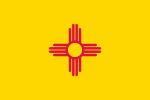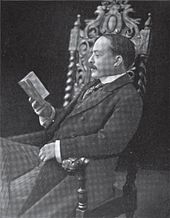- Miguel Antonio Otero (born 1859)
-
For other people of the same name, see Miguel Antonio Otero (disambiguation).
Miguel Antonio Otero (October 17, 1859–August 7, 1944), nicknamed "Gillie," was governor of New Mexico Territory from 1897 to 1906 and in later life the author of several books on Western lore. He was the son of Miguel Antonio Otero, a prominent businessman and New Mexico politician.[1]
Contents
Early life
Miguel Antonio Otero had an adventurous boyhood as his father, a businessman and railroad baron, moved the family from town to town across Kansas, Colorado, and New Mexico. The family established a permanent home in Las Vegas, New Mexico about 1879. He attended St. Louis University and the University of Notre Dame with his older brother Page, but preferred socializing to studying. He returned to Las Vegas in 1880 to work in his father's bank.
Career as politician
While working as a banker, land broker, and livestock broker in Las Vegas, Otero began his career in politics. In a few short years, he served as city clerk, probate clerk, county clerk, and recorder, and district court clerk. In 1892 he served as a delegate to the Republican National Convention and met Ohio Senator William McKinley. When McKinley was elected President in 1896, he appointed Otero governor of the Territory of New Mexico. Given Otero's youth (37 years), his meager statewide experience, and his lack of support from either political party, the appointment was somewhat of a surprise. The Otero name was well-known in New Mexico, however, and initially he was supported by a wide range of constituencies.
As New Mexico moved towards statehood, Otero survived struggles against a variety of political factions in his own party. After McKinley's assassination, he survived a particularly brutal battle with Thomas B. Catron to earn reappointment by President Theodore Roosevelt. The infighting eventually took its toll, and in 1906, Roosevelt replaced Otero after more than eight years in the governor's mansion.
At 46, Otero was still a young man when he left office. He returned to banking and mining interests for a while, then served as state treasurer from 1909 to 1911. Otero attempted a comeback as governor in 1912, but failing to receive the Republican nomination, bolted for the Progressive Party. Eventually he moved to the Democratic Party and became a supporter of Woodrow Wilson. In later years he received numerous other commissions, including four years (1917 to 1921) as marshal of the Panama Canal.
Career as author
In 1936, Otero published The Real Billy the Kid; With New Light on the Lincoln County War. After William Bonney was jailed in Las Vegas in 1880, Otero and his brother Page rode with the prisoner as he was transported by train from Las Vegas to Santa Fe. Remaining in Santa Fe for a while, the pair visited the Kid in jail many times, bringing him tobacco, gum, and sweets, and generally finding him a sympathetic, if misguided, figure. Written some fifty years after Pat Garrett's original account, Otero's was the first book to present Billy the Kid in a relatively positive light. The book was edited some say ghost written by Marshall Latham Bond whose father Hiram Bond was involved in trading with the Otero family out of Denver after 1872 and who owned a hundred square mile ranch in the area during the Lincoln County War.
Sandwiched around this book, Otero authored a three-part autobiography. The first installment, My Life on the Frontier, 1864-1882, was published in 1935 and covered the adventures of his youth through age 23, when his father died suddenly. My Life on the Frontier, 1882-1897 dealt with his early career in public service. My Nine Years as Governor of the Territory of New Mexico, 1897-1906 chronicles the turmoils of New Mexico on the verge of statehood.
The first book of the memoir is especially captivating, as Otero recalls several encounters with Western icons such as Kit Carson, Wild Bill Hickok, Gen. George Armstrong Custer, Doc Holliday, Bat Masterson, and Jesse James.
The Otero Letter
Ironically, one of the few famous names that Otero failed to drop in his autobiography has stirred debate among Wild West scholars. A carbon copy of a letter discovered at a flea market in 2001 and apparently written by Otero, places him in Albuquerque in April 1882, giving aid to Wyatt Earp and the rest of his party as they concluded their Vendetta Ride out of Tombstone, Arizona. In My Life on the Frontier: 1864-1882 (p. 217), Otero mentions the Earp brothers only as friends of Doc Holliday, providing no hint of the incident detailed in the "Otero Letter." By coincidence, it is fairly easy to establish that during most of this two-week period Otero was in Denver, where his father had just been swindled out of $2,400 by Doc Baggs, a notorious con man. Otero, who was traveling with his father, spent most of this period attempting to retrieve his father's bank note through various means. This and other factual problems with the letter have caused some experts to question its authenticity.
Notes
- ^ The naming of the three generations of Oteros is confusing and has been muddled by writers through the years.
- According to available evidence, the first Otero did not add any suffix to his name after his son was born. Modern historians often append Sr., but this cannot be considered correct as his son never used Jr. In My Life on the Frontier, 1864-1882, his son gave Otero the parenthetical suffix (I), but this probably was never used during Otero's lifetime.
- The second Otero also referred to himself without a suffix. But when clarification was necessary, as when describing his family in his autobiography, My Life on the Frontier, he used the parenthetical suffix (II) and specifically not Jr., since that is what he called his son. It is incorrect to refer to the second Otero as Jr.
- The third Otero was known as Miguel Antonio Otero, Jr. But in My Life on the Frontier, his father also refers to him as Miguel Antonio Otero (IV) -- not (III).
- Otero, New Mexico (ghost town in Colfax County), named in 1879.
- Otero County, Colorado, named in 1889.
- Otero County, New Mexico, named in 1899 while Miguel Antonio Otero (II) was territorial governor.
References
Otero, Miguel Antonio. My Life on the Frontier, 1864-1882 (New York, 1935).
—. My Life on the Frontier, 1882-1897 (Albuquerque, 1939).
—. My Nine Years as Governor of New Mexico Territory (Albuquerque, 1940).
—. The Real Billy the Kid; With New Light on the Lincoln County War (1936).
Governors of New Mexico 
Territorial (1850–1912) State (since 1912) McDonald · C. De Baca · Lindsey · Larrazolo · M. Mechem · Hinkle · Hannett · Dillon · Seligman · Hockenhull · Tingley · Miles · Dempsey · Mabry · E. Mechem · Simms · E. Mechem · Burroughs · E. Mechem · Bolack · Campbell · Cargo · King · Apodaca · King · Anaya · Carruthers · King · Johnson · Richardson · MartinezCategories:- 1859 births
- 1944 deaths
- Governors of New Mexico Territory
- Writers from New Mexico
- American politicians of Spanish descent
- American people of Spanish descent
- American politicians of Mexican descent
- American people of Mexican descent
- American writers of Mexican descent
- New Mexico Republicans
- New Mexico Progressives (1912)
- ^ The naming of the three generations of Oteros is confusing and has been muddled by writers through the years.
Wikimedia Foundation. 2010.

